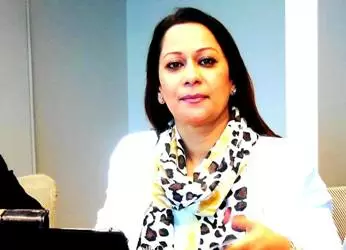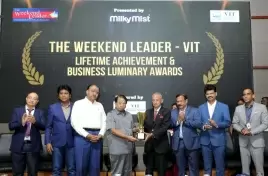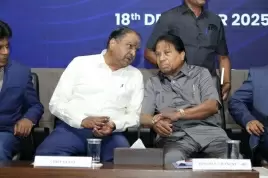A Kashmiri woman's pursuit for success beyond traditional confines takes her places
15-February-2014
Vol 5 | Issue 7
Dr Gazalla Amin is a woman who knows her mind. When she became the first woman member of the Jammu and Kashmir Chamber of Commerce and Industry in December 2013, the first thing that she did was to put up a ‘no smoking’ signboard outside the office premises in Srinagar.
Recently when the city received its heaviest snowfall of the season, bringing normal life to a standstill as a thick layer of snow made it impossible to walk on the streets, she decided to take matters into her own hands.
 |
|
Gazalla Amin’s journey from a medical college lecturer to a successful entrepreneur has been remarkable
|
With the snow cutters that she had purchased before the winter had set in, Amin and some of her employees cleared roads and by-lanes across the city, something that had been neglected by the local civic agency.
“The city was under a pristine carpet of white. No one had made it to work that day and I wondered why they were holed up inside their homes when it was so lovely.
“When I called up some of my staff, I realised that many would be stuck as only a few streets had been swept. So I simply gathered a few people together and we did the job ourselves. All of us have to get involved in the community, we cannot always rely on the government,” asserts Amin, who is in her late-forties.
For years now, Amin has been trying to work at bringing about positive change, however small or big, in the lives of ordinary Kashmiris.
She was not, however, groomed to be the change-maker she became. Like most middle class girls in the Valley, she did what her elders told her to do or had expected of her.
She went to the all-girls Presentation Convent in Srinagar where her parents wanted her to study and, later, although she did not want to pursue medicine, followed their wishes and enrolled in the medical college at Srinagar.
“I never wanted to be a doctor. But since my parents wanted me to be one, I had no choice. In those days, children hardly had a say in such matters,” remarks Amin.
During the fourth year of her MBBS degree, however, the family started looking for a suitable match for her and soon she was married to a young businessman.
“I completed my studies after marriage. My in-laws were quite supportive,” she says. But Amin never got down to practicing medicine as she became a mother soon after.
As she dutifully ran her home and took care of her three sons, she decided to put her education to good use by teaching at the newly instituted Jhelum Medical College in the early 1990s.
She continued there for three years but gave it up as her sons grew older and needed more attention. All this time, however, Amin never once abandoned her secret desire to do something that “lay outside the confines of what I had been told was ‘good’ for me”.
That opportunity came to her when she visited her native Sonawari village in Bandipora district of south Kashmir.
Amin recalls, “The land there was lying neglected and barren and I realised that I could make a difference in the local community by involving them in cultivating crops that would be commercially viable.”
As a child she had spent many summers in the pastoral landscape of Bandipora and had a fair idea of the hardships of rural life and the challenges involved in agriculture.
In 2004, when Amin decided to grow lavender and rose in order to extract and sell their oils, her family and friends were not in favour of her making the switch from medicine to business.
After all, women were never associated with entrepreneurship in Kashmir. But Amin was determined to fight such feudal attitude and invested her savings of about Rs 8 lakh in the farm to grow and process aromatic plants.
“As I was from a professional family, my exposure to running a business was minimal. But I decided to hang in there anyway. I didn’t earn anything out of it for three years but I knew I would learn the ropes on the job,” she adds.
Another driving factor for her was that she was keen to see local farmers increase their earning potential – a lavender crop brought in about 20 times as much as, say, maize – to better support their families.
Amin went through several hurdles but she handled each one of them on her own. When business started picking up, she took loans from the bank and government agencies to expand her operations. With increased capital in hand, she purchased superior equipment for farming as well as processing. She also employed the local youth to assist her in this.
Over the years, Amin’s Fasiam Agro Farms has turned out to be a huge success. Besides dealing in essential oils, she has expanded her activities to dry fruits and honey.
Apart from her business venture, she founded Women’s Association for Kashmir Entrepreneurs (WAKE) in an effort to provide direction to women’s entrepreneurship in the state.
Last year, she also contested the elections of the Jammu and Kashmir Chamber of Commerce and Industry, which had had no female representation since its inception in 1934. Amin broke into this privileged circle by becoming the first woman member of its executive council.
Amin has another first to her name: she is the only female recipient of the state’s Progressive Farming Award and recently received the ‘Women Entrepreneur of the Year Award’ from a prestigious media house.
Today, she takes her responsibility of mentoring other women very seriously. On her blog post, she writes: ‘Every woman has the duty to understand her own potential, make herself a success and give it back to others.’
Take this as a prescription from Dr Amin, medical doctor turned homemaker turned entrepreneur. - Women's Feature Service















